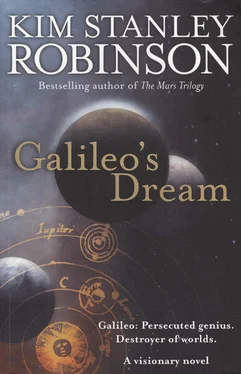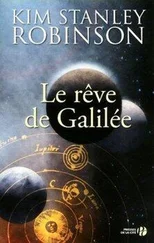Galileo’s Dream
by Kim Stanley Robinson
The Muses love alternatives.
—VIRGIL, ECLOGUES, BOOK III
All of a sudden Galileo felt that this moment had happened before—that he had been standing in the artisans’ Friday market outside Venice’s Arsenale and had felt someone’s gaze on him, and looked up to see a man staring at him, a tall stranger with a beaky narrow face. As before (but what before?) the stranger acknowledged Galileo’s gaze with a lift of the chin, then walked toward him through the market, threading through the crowded blankets and tables and stalls spread all over the Campiello del Malvasia. The sense of repetition was strong enough to make Galileo a little dizzy, although a part of his mind was also detached enough to wonder how it might be that you could sense someone’s gaze resting on you.
The stranger came up to Galileo, stopped and bowed stiffly, then held out his right hand. Galileo bowed in return, took the offered hand, and squeezed; it was narrow and long, like the man’s face.
In guttural Latin, very strangely accented, the stranger croaked, “Are you Domino Signor Galileo Galilei, professor of mathematics at the University of Padua?”
“I am. Who are you?”
The man let go of his hand. “I am a colleague of Johannes Kepler. He and I recently examined one of your very useful military compasses.”
“I am glad to hear it,” Galileo said, surprised. “I have corresponded with Signor Kepler, as he probably told you, but he did not write to me about this. When and where did you meet him?”
“Last year, in Prague.”
Galileo nodded. Kepler’s places of residence had shifted through the years in ways Galileo had not tried to keep track of. In fact he had not answered Kepler’s last letter, having failed to get through the book that had accompanied it. “And where are you from?”
“Northern Europe.”
Alta Europa . The man’s Latin was really quite strange, unlike other transalpine versions Galileo had heard. He examined the man more closely, noted his extreme height and thinness, his stoop, his intent close-set eyes. He would have had a heavy beard, but he was very finely shaved. His expensive dark jacket and cloak were so clean they looked new. The hoarse voice, beaky nose, narrow face, and black hair made him seem like a crow turned into a man. Again Galileo felt the uncanny sensation that this meeting had happened before. A crow talking to a bear—
“What city, what country?” Galileo persisted.
“Echion Linea. Near Morvran.”
“I don’t know those towns.”
“I travel extensively.” The man’s gaze was fixed on Galileo as if on his first meal in a week. “Most recently I was in the Netherlands, and there I saw an instrument that made me think of you, because of your compass, which, as I said, Kepler showed me. This Dutch device was a kind of looking glass.”
“A mirror?”
“No. A glass to look through. Or rather, a tube you look at things through, with a glass lens at each end. It makes things look bigger.”
“Like a jeweler’s lens?”
“Yes.”
“Those only work for things that are close.”
“This one worked for things that were far away.”
“How could that be?”
The man shrugged.
This was interesting. “Perhaps it was because there were two lenses,” Galileo said. “Were they convex or concave?”
The man almost spoke, hesitated, then shrugged again. His stare went almost cross-eyed. His eyes were brown, flecked with green and yellow splashes, like Venice’s canals near sunset. Finally he said, “I don’t know.”
Galileo found this unimpressive. “Do you have one of these tubes?”
“Not with me.”
“But you have one?”
“Not of that type. But yes.”
“And so you thought to tell me about it.”
“Yes. Because of your compass. We saw that among its other applications, you could use it to calculate certain distances.”
“Of course.” One of the compass’s main functions was to range cannon shots. Despite which very few artillery services or officers had ever purchased one. Three hundred and seven, to be precise, had sold over a period of twelve years.
The stranger said, “Such calculations would be easier if you could see things farther away.”
“Many things would be easier.”
“Yes. And now it can be done.”
“Interesting,” Galileo said. “What is your name again, signor?”
The man looked away uneasily. “I see the artisans are packing to depart. I am keeping you from them, and I must meet a man from Ragusa. We will see each other again.”
With a quick bow he turned and walked along the tall brick side wall of the campiello, hurrying in the direction of the Arsenale, so that Galileo saw him under the emblem of the winged lion of St. Mark that stretched in bas relief over the lintel of the great fortress’s entryway. For a second it looked as if one bird-beast were flying over another. Then the man turned the corner and disappeared.
Galileo turned his attention back to the artisans’ market. Some of them were indeed leaving, folding up their blankets in the afternoon shadows and putting their wares into boxes and baskets. During the fifteen or twenty years he had been advising various groups in the Arsenale, he had often dropped by the Friday market to see what might be on display in the way of new tools or devices, machine parts, and so on. Now he wandered around through the familiar faces, moving by habit. But he was distracted. It would be a good thing to be able to see distant objects as if they were close by. Several obvious uses sprang to mind. Military advantages, in fact.
He made his way to one of the lens-makers’ tables, humming a little tune of his father’s that came to him whenever he was on the hunt. There would be better lenses in Murano or Florence; here he found nothing but the usual magnifying glasses that one used for close work. He picked up two, held them in the air before his right eye. St. Mark’s lion couchant became a flying ivory blur. It was a poorly done bas relief, he saw again with his other eye, very primitive compared to the worn Roman statues under it on either side of the gate.
Galileo put the lenses back on their table and walked down to the Riva San Biagio, where one of the Padua ferries docked. The splendor of the Serenissima gleamed in the last part of the day. On the riva he sat on his usual post, thinking it over. Most of the people there knew to leave him alone when he was in thought. People still reminded him of the time he had shoved a bargeman into the canal for interrupting his solitude.
A magnifying glass was convex on both sides. It made things look larger, but only when they were a few fingers from the glass, as Galileo knew very well. His eyes, often painful to him, had in recent years been losing their sharpness for nearby things. He was getting old: a hairy round old man, with failing eyesight. A lens was a help, especially if ground well.
It was easy to imagine a lens grinder in the course of his work holding up two lenses, one in front of the other, to see what would happen. He was surprised he hadn’t done it himself. Although, as he had just discovered, it didn’t do much. He could not immediately say why. But he could investigate the phenomenon in his usual manner. At the very least he could look through different kinds of lenses in various combinations, and simply see what he saw.
There was no wind this Friday afternoon, and the ferry’s crew rowed slowly along the Canale della Giudecca and onto the open lagoon, headed for the fondamente at Porta Maghere. The captain’s ritual cursing of the oarsmen cut through the cries of the trailing seagulls, sounding like lines from Ruzante. You girls, you rag dolls, my mother rows better than you do—
Читать дальше
Конец ознакомительного отрывка
Купить книгу












